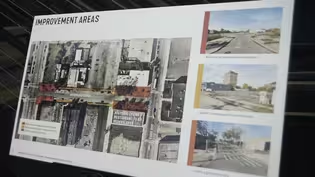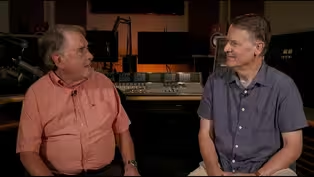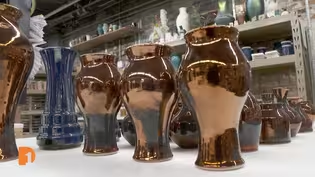
Commemorating the 50th anniversary of President Gerald Ford's Inauguration
Clip: Season 9 Episode 5 | 10m 13sVideo has Closed Captions
U-M Ford School of Public Policy experts reflect on President Ford’s legacy.
August 9 will mark the 50th anniversary of Gerald Ford becoming U.S. President. The University of Michigan’s Gerald R. Ford School of Public Policy is named after the country’s only president to hail from Michigan. Contributor Zoe Clark of Michigan Public talked with Dean Celeste Watkins-Hayes and Professor Jenna Bednar about President Ford and the election process half a century later.
Problems playing video? | Closed Captioning Feedback
Problems playing video? | Closed Captioning Feedback
One Detroit is a local public television program presented by Detroit PBS

Commemorating the 50th anniversary of President Gerald Ford's Inauguration
Clip: Season 9 Episode 5 | 10m 13sVideo has Closed Captions
August 9 will mark the 50th anniversary of Gerald Ford becoming U.S. President. The University of Michigan’s Gerald R. Ford School of Public Policy is named after the country’s only president to hail from Michigan. Contributor Zoe Clark of Michigan Public talked with Dean Celeste Watkins-Hayes and Professor Jenna Bednar about President Ford and the election process half a century later.
Problems playing video? | Closed Captioning Feedback
How to Watch One Detroit
One Detroit is available to stream on pbs.org and the free PBS App, available on iPhone, Apple TV, Android TV, Android smartphones, Amazon Fire TV, Amazon Fire Tablet, Roku, Samsung Smart TV, and Vizio.
Providing Support for PBS.org
Learn Moreabout PBS online sponsorship(mellow percussive music resumes) - Dean, tell me a little bit about Ford, the man.
- Well, in order to understand Ford, the man, it's helpful to go back 50 years, 1974, when Ford becomes President.
It was a very tumultuous time in the country.
In the previous 10 years, Ford had witnessed the assassinations, and we'd all witnessed historically the assassinations of Martin Luther King Jr., John F. Kennedy, Robert F. Kennedy, in that decade or so prior.
He was not elected to the presidency.
He was not elected to the vice presidency.
Gerald Ford, the Congressman, had become House Minority Leader, which was really one of his highest aspirations.
And then gets positioned to become Vice President after the departure of Spiro Agnew and then after President Nixon resigns.
So this is a leader, who was called into a moment of authority, called into a moment of leadership, that he did not anticipate.
And yet, he brought his core values to the assignment, humility, bipartisanship, honor, respect, honesty, and all of those different core values bound together by a commitment to serve.
- Speaking of the moment that we're in right now and the need for civility in what can feel like overwhelming and some dark times, I'm curious about how you think Ford might see this moment that we find ourselves in, both as a Republican but also as a leader.
- Well, I think Ford would look at this moment and say, "Tumultuous times are part of the long arc of history."
- Mm.
- And in the moment it can feel very anxiety producing and very worrying.
But when we look at the long arc of history, we know that we have had times of turbulence.
We know we've had times, unfortunately, of political violence in this country.
We've had times where the country has been at odds in terms of where do we go and who do we wanna be as a nation.
So how do we unify?
What are the areas of common ground?
What are the areas of common concern and how do we move forward on the basis of those?
- It's a combination of recognizing that we have a joint responsibility to work together to shape our country.
And so lifting up these democratic norms, like respecting those who see the world differently than you.
And the more that I've had the opportunity to learn about President Ford as part of my appointment here, the more I believe that this was something that he felt very strongly about.
That we have a civic responsibility, and that you do reach across and think about how you can find this common ground and then you build on that rather than emphasizing differences.
- One of the things I think we all hear is like, folks want more of that, right.
I don't think a lotta people, I hope not a lotta people wake up in the morning and go, "Who am I gonna be really angry at today?
"Who do I wanna just go yell at?"
Instead, we hear this greater calling to treat each other with civility and kindness and step up for public service, but there seems to be something standing in the way from that.
Do you have a sense of what that something is?
- I think it's a number of things.
I think it's anxiety and concern about people ensuring that they're leaving the world in a better place than when they found it for their children.
That their children and grandchildren have some sense of economic and social and political stability and a feeling of anxiety about whether those things will hold.
I think that we have to be honest, we are now in an ecosystem, an information ecosystem, with social media and all kinds of other tools that circulate information, disinformation, misinformation, that heighten those anxieties, right.
And our sense of the other side is out to get me and it's a zero sum game, and it's really about the next power play.
So the first step I think is us being conscious of that and conscious of those dynamics, and then thinking about what can each of us proactively do to counterbalance that?
How do we respond to our own anxieties and the ways in which we may act on them in ways that instill and inspire fear and hatred and anger and frustration?
How do we recognize it and deal with it more constructively, but also how do we demand better?
And reminding us of the importance of the social fabric, so much of politics people assume is in Washington DC, and Washington DC, only.
So their feeling around politics is really about how they feel about Washington at any given moment.
But in fact, we know that old adage, all politics is local.
So when we look at what's happening in our city councils, when we think about what's happening in our state legislatures, when we think about our governors, when we think about our mayors and other leaders, there are examples that I think people can get excited about of government at work, government working effectively, people working effectively across the aisle.
So we've gotta recognize that and lift up those positive examples of government functioning well.
- Professor, you're the Faculty Director of UMICH Votes.
You are doing a lot of work with students, talking with students of the Ford School, named after, of course, President Ford.
Tell me what you're hearing from these younger voters about what they want to see for the world today and into their future.
First, they believe so much in our country and in what its potential is.
And then the other thing I'm hearing, two more things I'm hearing.
One is anger is really, is this what you're offering us?
And then, just this confidence that we can do it better.
And this is a piece of what we're really working on here at the Ford School, but also across the university, recognizing that as tumultuous as this moment is, the arc of history is long.
And so it's kind of coming to terms with your own emotional self and developing a sense of belief that you can do something about it.
Belief that the best way to do something about it is really to listen to others, including those who are saying things that you don't necessarily agree with, right, and recognizing that this diversity of perspectives is absolutely necessary for democracy.
- I don't wanna talk about President Ford without talking about Betty Ford.
- Yeah.
- Such a force.
- [Celeste] Absolutely.
- [Zoe] Tell us about Elizabeth Ann Ford and the role that she really forged as First Lady.
- Betty Ford was a confidant and, and this is probably the most important part of her legacy, she was willing to be upfront about talking about issues that you did not talk about in those times, her breast cancer diagnosis, her struggle with substance use.
Huge legacy around being willing to tell the truth and to tell one's own story to help others.
- And I think Professor, particularly when I think about younger voters and this idea of authenticity, that's so much of what they're looking for.
What I hear when I speak with younger voters, right, this, look be truthful with us, we may not like it, but don't lie.
And in some ways, Betty Ford forged that.
- That's so perceptive because I think we tend to think that they, because they're inexperienced voters, we can offer a package and they'll buy it, and they don't buy it.
They have a perception that I think I was missing when I was their age, and so they can see through it.
And they really do long for authenticity.
They long for someone who will tell them what's tough, tell them what's gonna be difficult, as well as what's possible.
- As we wrap up, I'm curious to hear from both of you, Professor, I'll start with you.
What's a takeaway that you'd like folks, particularly heading into this election to be thinking about?
- This is, maybe we can go back to President Ford, his ability to think for himself.
That maybe as we go out to vote, we do the same thing, and we think about not just the top of the ticket but all the way down.
And then, of course, flipping over the ballot and looking at the other side and thinking for ourselves.
- And what I would add is think about this election season and every election season as an opportunity to rededicate yourself to some kind of service.
At this point of renewal, what am I going to do to engage with my community, right?
How am I gonna get more civically involved?
How am I gonna volunteer?
How am I gonna talk to young people?
How am I gonna donate my time, my economic resources?
How am I gonna do something that contributes and moves the needle forward rather than being kind of an observer and a spectator of all of the actions?
Detroit’s Chinatown gets 1 million for improvements
Video has Closed Captions
Clip: S9 Ep5 | 4m 3s | Detroit’s Chinatown gets $1 million for improvements. (4m 3s)
One Detroit Weekend: August 2, 2024
Video has Closed Captions
Clip: S9 Ep5 | 1m 45s | Dave Wagner and Peter Whorf share what’s coming up this week in and around the city. (1m 45s)
Pewabic: One of nation’s oldest pottery, ceramics factories
Video has Closed Captions
Clip: S9 Ep5 | 5m 57s | One Detroit visits Pewabic, one of the nation’s oldest ceramic and pottery factories. (5m 57s)
Providing Support for PBS.org
Learn Moreabout PBS online sponsorship
- News and Public Affairs

Top journalists deliver compelling original analysis of the hour's headlines.

- News and Public Affairs

FRONTLINE is investigative journalism that questions, explains and changes our world.












Support for PBS provided by:
One Detroit is a local public television program presented by Detroit PBS


